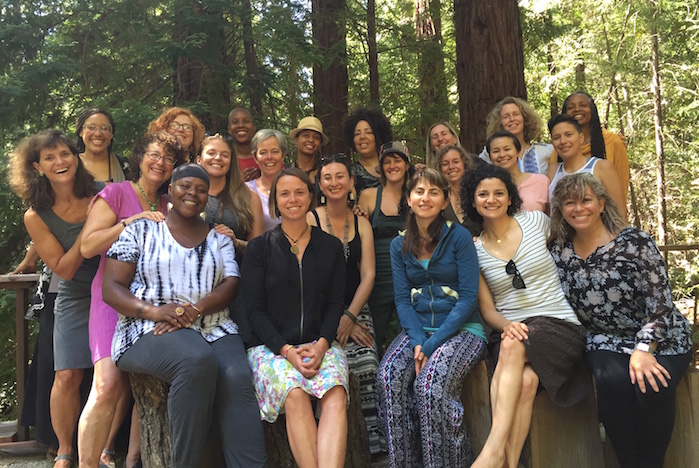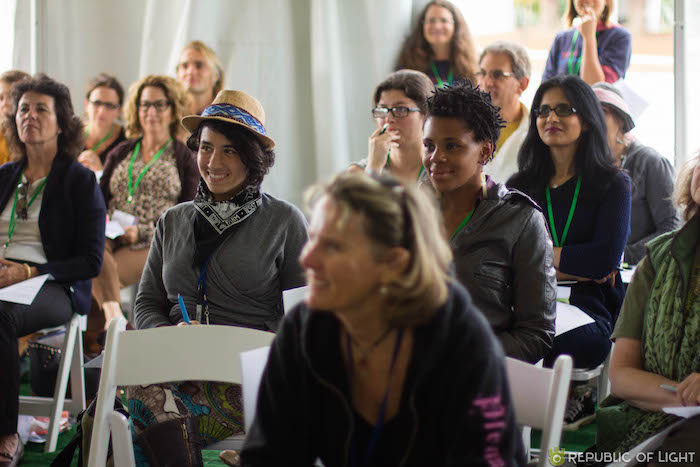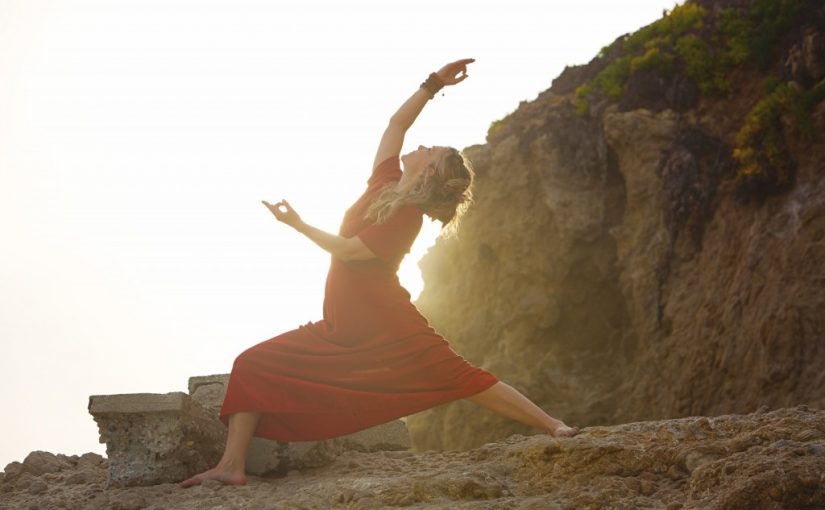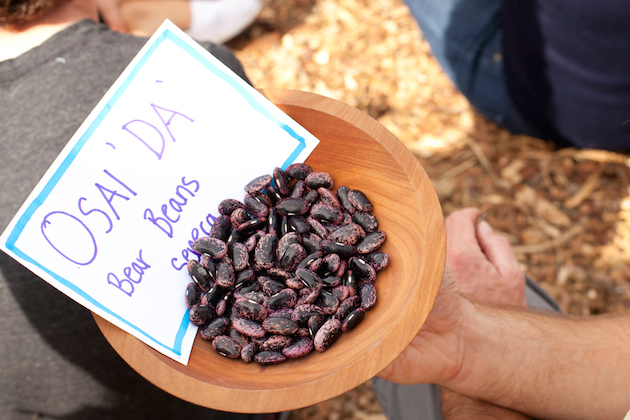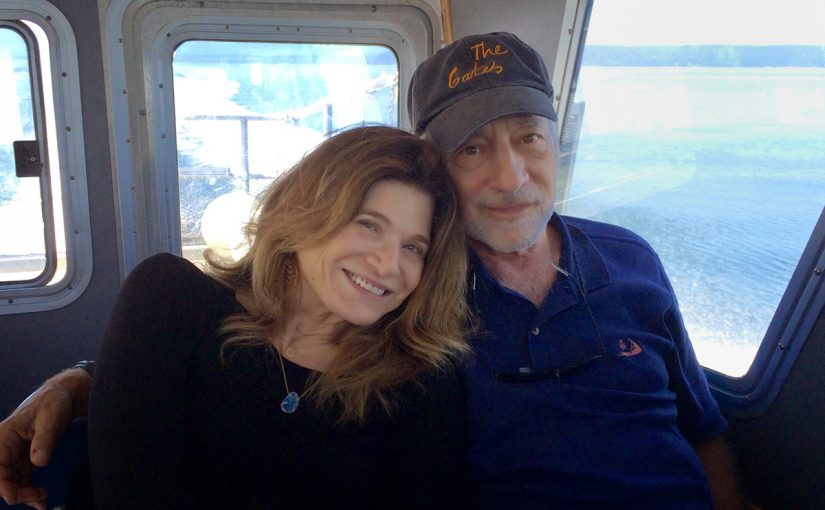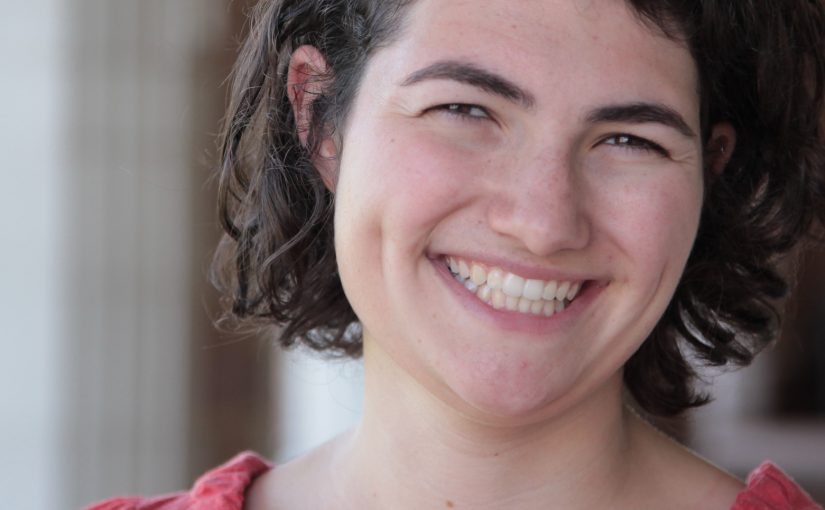It’s easy to get lost in the weeds when you’re inside of a large project or organization. You strive to better an organization because you believe in it. You believe in what it aspires to and what it delivers. You give yourself in service and you give of yourself at every opportunity…but when in the day-to-day tasks of managing emails, scheduling meetings and addressing the latest emergency, it is easy to lose sight of the bigger picture and the real reason behind what we do. And then sometimes you get lucky. The clouds part and you see the view from high above and you remember, with your whole being, why Bioneers is so uniquely important.
Just as nature has her cycles, so do we. And our Kinship Journeys are an important part of our annual rhythm of sustainability in action.
Every year Bioneers takes a group of Kinship-level supporters—people blessed with the ability to support at the $25,000 level and higher—on a journey with purpose, beyond a local hotel and directly linked with sustainability, connection and personal growth. It reconnects us with the core of our mission and purpose…to feed the soul of our work and build our community and tend our community garden of relationship.
This year our Kinship Adventure was to British Columbia, in the spirit of place-based movement building and seeing around the corners. We situated ourselves at the intersection of savvy First Nations who are leveraging treaty rights and deep culture, visionary and compassionate civic government, effective and committed activists, strategic funders and change-makers…and us, a group of Bioneers weaving it all together, as witnesses and as participants and partners.
There’s a lot to be said about bearing witness—seeing and making more real that which is happening. Bioneers bears witness as a community; we witness each other creating a better world, and we do it progressively like a symphony. We’re bringing together forces of hope and goodness that stand for justice and celebrating the beauty and the sacredness of Life. We’re bioneering a new world, together.
As a group of fifteen we arrived in Vancouver. Some of us were meeting again as old friends, some as acquaintances glad for the opportunity to deepen relationships, and some meeting for the very first time. It was exciting and the air was electric with our joined spirits in adventure.
Canada is and has been in the throes of an extremely right wing, pro-fossil fuels administration, and the welfare of the dispossessed or the life-challenged have not been supported. First Nations have been strategically divided in efforts to access the fossil fuels below their soil or to build pipelines over their lands. But Canada is turning around, and Vancouver is at the heart of it.
We started bright and early, beginning with a trip north of Vancouver to the Tsleil-Waututh First Nation’s reserve. We were treated as honored guests, greeted and hosted by Chief Reuben George and attended by his brother, Gabriel George. Gabriel had assembled their traditional dance troupe, and in the language of the Tsleil-Waututh he shared their creation story, as well as their most important legends, songs and dances. Their legal team presented to us their efforts to clean up their lands and to protect their waterways from the local oil company, Kinder Morgan, which sits like a malevolent dragon opposite the traditional home of the “People of the Inlet”, polluting their air and threatening their waters. And they are winning! Kinder Morgan is running out of options. They will be gone soon, and their plans to expand their portage for transferring oil from new pipelines to more oil tankers will not happen. (You can read more about this here.)
The Tsleil-Waututh have literally come back from the brink of near-extinction, with numbers dropping down to as few as 50 survivors, whereas they’d numbered over 5,000 at their peak. Now they are 500 strong. And thanks to their eldest culture carrier, Chief Leonard George, son of famous actor and Tsleil-Waututh chief, Dan George, and his family, the nation is rising again. Through the power of ceremony and the reestablishment of their connection to their spirituality, they have found themselves again. They have turned around the alcoholism, the domestic strife, the dropouts and the incarcerations. They are a nation of proud people who are protecting their land, their home and their community…and their Mother…with education, ingenuity, courage and skilled leadership.
Vancouver Mayor Gregor Robertson and his remarkable team have committed to making Vancouver the greenest city in North America—including being fossil-fuel-free—by 2020. And they’re doing it. They invited us in to experience how they are doing it and we were all not just impressed, we were moved. We were inspired by the clear humanity these people wield in their daily efforts to make good on this promise. In our meeting with the inspiring Deputy Mayor, Councilor Andrea Reimer, she actually wept spontaneously as she shared with us her daily concerns for the people who rely on the city for support and for change that will bring better days. And then she left us, her dinner barely finished, as she headed to the airport to take a red eye to attend a Canadian Mayors climate conference. Impressive leadership.

The city’s Director of Sustainability, Amanda Petre-Hayes, and her colleague, Chris Higgins, generously took us on a city tour by bus that showed us truly progressive social programs. We experienced the magic of City Studios which brings sustainability innovations to life throughout the city, and toured a wastewater heat-exchange heating plant that is turning wastewater heat into fresh heating for thousands of homes. We learned about a safe injection center, where those sadly addicted to IV drugs are treated with dignity and given a safe place where someday, they may begin a road to recovery, while limiting the spread of HIV and diseases.
The next day we were hosted at the office of Tides Canada, where they continue to do good works in multiple arenas, from Strategic Philanthropy to Impact Investing towards sustainability and environmental and social justice. The climate for social good organizations is hard in Canada. Organizations like Tides Canada are to be lauded for staying in business by engaging the fight—they deserve our support.
Afterwards, we heard from Janice Abbott. Janice has been the CEO of Atira Women’s Resource Society since 1992 and the CEO of Atira Property Management Inc., its wholly-owned, for profit subsidiary, since she conceived of and launched it in October 2002. She lead the Society through its growth from a single transition house located in South Surrey with a staff of seven, to a large multi-service agency with two, for-profit subsidiaries, a development arm, a women’s arts society and more than 500 staff. She is committed to employing people with lived experience and from community and since 2007 has hired more than 280 staff with multiple barriers to employment. She’s headed up numerous innovative capital projects and has led the introduction of recycled shipping container housing to Vancouver. Winner of numerous awards, Janice continues to grow the organization; the latest development includes a high-rise multi-income-level building, where low-income and market income residents will be neighbours. Janice and Atira are inspiring!
Joel Solomon is a lifelong Bioneer and a powerful, creative force of convening, moving and shaking, and he took us on a walk through Vancouver’s Lower Eastside and Gastown, showing us how the city is supporting those at the very lowest rungs of the economic ladder. From the Carnegie Centre with their low-cost, high-quality meals to a library, recreational facilities, urban gardens, the InSite safe-injection centre and a blooming café scene, Vancouver is creating a place for everyone and where everyone is valued, no matter their challenges or economic status.
Later in the day we met ForestEthics Advocacy’s Director of Strategy and Communications, Julia Pope, who took us on a tour of their campaigns and efforts to protect the forests and the waters of Canada, focusing primarily on the Tar Sands and pipelines issues.
And that night Joel hosted a dinner at his home where we gathered to share stories and meet one another more deeply. We were joined by the Mayor and his Chief of Staff, Mike Magee. After a long day administering his ever-greener city, Gregor was full of energy and enthusiasm for Vancouver and his team, and shared how Bioneers helped orient him towards where he is now—crediting Bioneers, in fact, for putting him on this path when he attended several Bioneers conferences It was pleasantly poignant to see him leave on his bike afterward, cycling into the night on his own road as a Bioneer.
Next stop: Cortes Island—one of the most beautiful places on the planet—and home to the Hollyhock Center. Founded 25 years ago as a place for the exploration of human potential and a lab set up to facilitate change for a better world, it sits on this supernaturally beautiful island that has been home to four separate First Nations as a summer retreat for millennia. It’s literally at the end of the road in North America —the last ferry stop at the end of the last road. It’s out there. Upon arrival, we were met by Dana Bass Solomon, Joel’s wife and CEO of Hollyhock, who warmly welcomed us to this special place.
The warm waters and the serenity of Cortes were amazing. The Pineapple Express current that circulates around the Pacific reaches the waters here, making a swim inviting—amazing to those of us from lower latitudes where a wetsuit would have seemed apropos. It was delightful!

As we settled in, after a delicious, grown-in-the-Hollyhock-garden lunch, we met with three inspiring changemakers who would give us much to consider and inspire deep conversations over the next three days: Tzeporah Berman, Eriel Deranger and Karen Mahon.
Tzeporah Berman is one of the most effective eco-campaigners who has spent the past 18 years evolving from a civil-disobedient student to a key negotiator, reworking policies and agreements with global corporations, governments, and environmental groups. Seriously – she wrote the book on activism in our time. (You can read it yourself and I wholly encourage you to pick up a copy, This Crazy Time: Living Our Environmental Challenge.
Eriel Deranger – whom I had the pleasure of working with “back in the day” at Rainforest Action Network, is the communications manager of the Athabasca Chipewyan First Nation (ACFN) of Alberta and is a First Nations Dene Indigenous activist. She and her family have long battled industrial and often illegal activities on treaty lands and she is a powerful force for the Tar Sands lobby to reckon with. She’s courageous, committed and deeply grounded in her culture and community. Eriel will be speaking at Bioneers this year.
Karen Mahon – new Executive Director of Forest Ethics Canada, past campaign director at Greenpeace Canada, one-time Greenpeace Canada Executive Director, and long-time Hollyhock Leadership Institute Executive Director, was on the blockades at Clayoquot and at Burnaby Mountain to stop deforestation. Her lifetime of activism and commitment to social change, her experience and her maturity make her a skilled change maker and leader.
These are the people we were sitting with over the three days spent at Hollyhock. It was profound. It was terrible. It was heartening. It was complex. It was so many things that rolled us out into a hopeful forward direction. I cannot thank them enough for the time and focus they shared with us. Their Kinship is priceless!
On this leg we also had the honor of being with Greenpeace International and Hollyhock co-founder, Rex Wyler, whose film, How to Change the World is making its way through the festival circuit and provides history and guidance to those who would bear witness and demand change, and then make it. Paul Stamets, longtime Bioneer, joined us to share his mycological wisdom – he even brought the biggest fungus I’ve ever seen to a delightful dinner party generously and lovingly hosted by Play Big’s Carol Newell.
And so many others – we shared a magnificent afternoon and evening at Carol’s house, eating a locally caught salmon feast that Tzeporah and Karen created for us, swimming in the warm waters, talking and sharing and really creating community with purpose. It was a momentous occasion and one I will never forget.
On our last day I was up early for a walk through the cedars with Rex and our own Mr. Gratitude, Bioneers Executive Director, Joshua Fouts. We talked about the world we’re watching and the world we’re creating as we savored the smells of the forest and the taste of the rarified air. Rex took us to the house he built for his family, now empty but part of Hollyhock, and talked about his film. As we entered the backyard through the hand-crafted wooden gate a deer sat, unafraid, as it watched us enter its domain and move through. It never flinched.
We spent the rest of the day experiencing Cortes – some of us wandering the beach and others kayaking the waters. It is a truly magical place – a gift to those who visit and steward it.
Hollyhock hosts a weekly oyster BBQ, freshly gathered from its shores which we gratefully took advantage of before having our final dinner together on this magical trip we created and shared together. Our Kinship sister Sarah Grace created a song and played guitar as we sat by the fire in the Hollyhock living room where we laughed and reflected on all we’d heard, all we’d learned. And we looked forward to when we’d be back together again for another deep dive into the world we are co-creating.
And upon my own reflection, I realized that what we did together in this densely informed and feeling week mirrored what the Bioneers Conference does – we came together as people deeply committed to a better world – who shared with one another and came away enriched and inspired to achieve our goals, to be successful in our journey into the world the world wants and is coming into being.
In Kinship. True kinship. It was profound.
Next year we’re going to Spain where there will be a mini-conference in June. Sponsored by the Basque government, we will gather in San Sebastian, a beautiful city situated on the shores of the Atlantic. We’ll take some time after the event to take a Kinship tour – in the same spirit we met in Canada, next year, we’ll be on another continent. I hope you’ll join us, in Kinship.

To find out more about Bioneers’ Kinship Circle and Journeys, contact Branden directly: branden@bioneers.org or 415-660-9301.
